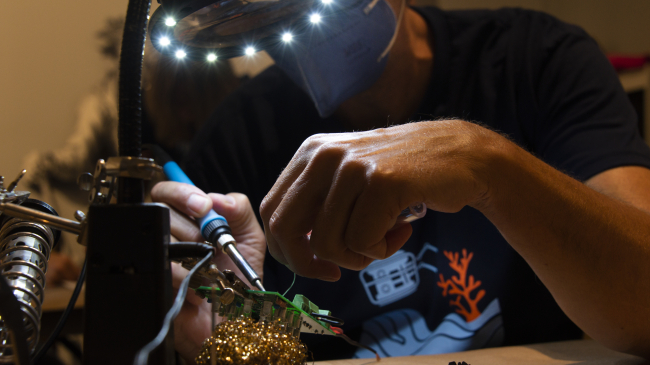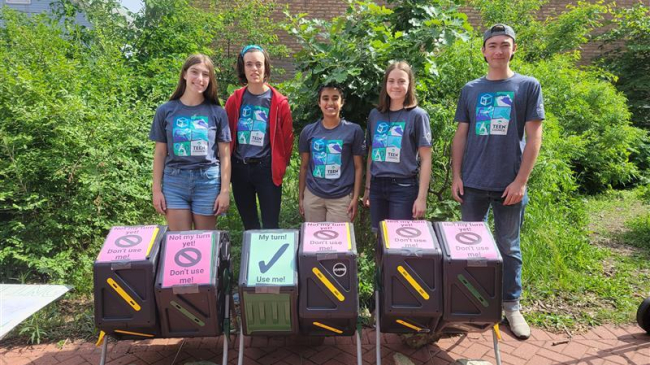The San Francisco Bay National Estuarine Research Reserve offsite link has partnered with a local organization called Downtown Streets Team offsite link to provide outdoor learning opportunities for the unhoused community. This partnership highlights the power of bringing environmental education experts together with organizations that specialize in supporting some of the most underserved audiences.

Downtown Streets Team members explore the local estuary during an event with the San Francisco Bay National Estuarine Research Reserve. (Image credit: Courtesy of Bella Mayorga)
Bella Mayorga, Education Coordinator at the San Francisco reserve, learned about Downtown Streets Team during the State of the Estuary Summit in 2021 offsite link. Downtown Streets Team offers volunteer, housing, and employment support for unhoused community members, including opportunities to remove debris and litter from city streets. “These beautification shifts are not only supporting the environment, but they are supporting individuals who are coming out of homelessness,” explained Romie Nottage, Senior Director for the East Bay and Social Innovation with Downtown Streets Team during her presentation offsite link. Members earn non-cash basic needs stipend, access to case management, employment services, and a support network. From 2005-2020, they removed more than 10 million gallons of debris from city streets that might otherwise have run off into the estuary.
During that presentation, Downtown Streets Team invited anyone who was interested to come to one of their meetings to learn more. “I thought, well, that would be a cool way to connect the interest of the education program to diversify the audiences that I reach and potentially partner with a new organization that already has a strong connection to unhoused communities,” said Mayorga. She took them up on their offer and followed up with a proposition of her own: to help organize free educational programming for the unhoused community. After all, Downtown Streets Team members had done so much to support the estuary; it was only fitting for them to get to experience estuary education in return.
It was really rewarding for myself and for them, so it really felt like a win-win type of program.
First, they organized field trips to local parks that were easily accessible by public transit. As a land area that channels rainfall to storm drains, creeks, and streams, that connect to the estuaries, these urban settings offered rich opportunities to appreciate, explore, and learn about the outdoors. “You don’t necessarily have to go out to somewhere deep in the wilderness to experience nature,” said Mayorga. These trips made it clear that this was an important collaboration. “It was really rewarding for myself and for them, so it really felt like a win-win type of program,” she said.
Downtown Streets Team and the reserve also started bringing groups out to China Camp State Park, one of the reserve’s component sites. This scenic location features salt marshes, meadows, oak habitats, and, on clear days, serene views across San Pablo Bay. After a round of introductions and some background information about the estuary, Mayorga would set the expectations. “This event is for them to learn about nature and enjoy nature.... there’s no expectation of what they should or shouldn’t know,” she would explain. They would then walk about a mile through the reserve, observing and discussing birds, wetlands, plants, and other wildlife along the way.

The conversations were informative for everyone involved. “The kind of questions that they ask are really interesting questions, questions that sometimes I don’t have the answer to,” said Mayorga. These included questions like, “‘Why is the sea salty?’ and ‘Why do pigeons bob their heads when they walk?’” Mayorga said. “I kind of have to create the space of us learning together.... Why do pigeons bob their heads when they walk?” Whenever she didn’t know the answer, they would look it up and learn together.
For Mayorga and the Downtown Streets Team, however, these events weren’t all about knowledge. “I started bringing in some wellness components, so some meditations and deep breathing exercises for them to really enjoy the time that they are out at China Camp State Park or wherever we’re having the program,” said Mayorga. “They enjoyed learning about the estuary, but [what they appreciated most was] just having other people to engage in dialog with and build community with… We also had a lot of social bonding during these experiences.”
Mayorga also held a fundraiser at the reserve’s headquarters, Estuary & Ocean Science Center, raising $500 for supply kits for the team members. The 20 kits they distributed included hygiene items, new socks, a shopping bag to carry all the supplies, and a handwritten card with a fun science fact on it.
Mayorga hopes that getting to experience the estuary brings another layer of meaning to the Downtown Streets Team’s stewardship work removing debris and litter. “I help them learn more about this habitat that they are helping to conserve,” said Mayorga.
I think there’s a lot of value in finding a local organization that's already supporting this community and finding ways that you can plug your education program into what they are already doing to enhance or complement their work.
San Francisco Bay reserve staff recognize this as a high-impact partnership and are committed to continuing the meaningful work that Mayorga started with Downtown Streets Team. “I think there’s a lot of value in finding a local organization that's already supporting this community and finding ways that you can plug your education program into what they are already doing to enhance or complement their work,” said Mayorga. “That way, they continue supporting that community, and you’re enhancing that work but you’re not picking someone up and dropping them into your program and you’re not replicating work that’s already being done.”




